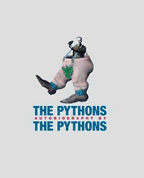
|
| |
|||
| Posted on Tue, Dec. 30, 2003 | |||
|
High jinks are back in life of Monty The Pythons Autobiography Stand totally erect, straight-backed, bowler lodged firmly on your head. Now bring your right knee up, chin level. Back down in a semi-squat, then cluck like a chicken. Snap the right leg out viciously, haul it back in and then out again like a confused pendulum. The motion takes you forward for your first slithering step without disturbing the contents of your briefcase. Aaaah... you always remember your first Silly Walk. And the first time you saw Monty Python's Flying Circus - Eric Idle, Terry Jones, John Cleese, Graham Chapman, Michael Palin, and the invisible American, Terry Gilliam - leading the Second British Invasion as avatars of a new type of comedy. The Python Autobiography by the Pythons is a collection of recent interviews spliced together with diary entries and more than 1,000 pictures. Reading this coffee-table-size book is like trying to follow one of the Pythons' shows. "And now for something completely different": Here is a passage from Michael Palin's diary written during the filming of Life of Brian, followed by a recent John Cleese recollection about his brief foray into journalism for Newsweek, segueing into early sketchbooks of Terry Gilliam. The effect is ultimately a coherent, funny, and poignant history of a brilliant group of comic writers and actors at a time in TV that will not happen again. Oh yes, it's also irreverent as only Python can be. The death of Graham Chapman in 1989 left the group short a founder, and perhaps its strongest straight character actor and wordsmith. In the editor's words: "Due to his insistence on being inconveniently dead, Dr. Graham Chapman was unable, more than unwilling, to author this section of the book himself." But Chapman passages - using old quotes from him and current interviews with his brother, sister-in-law, and former lover - appear throughout the book, providing non sequiturs that make the narrative work. Watching PBS's first airing of Monty Python's Flying Circus and the release of And Now for Something Completely Different was an awakening to a new form of TV comedy, which was both intellectual and crude, often confusing because of its British references, and hilarious. (At least to a college senior anesthetized by years of Laugh-In.) This comedy was new to the United States only. Flying Circus was the culmination of a decade of satire that had arisen in Britain, fueled by the likes of Peter Cook and David Frost. But Python did make an important contribution, which was perhaps the main reason for success. Spike Milligan of Goon Show fame had experimented with sketch comedy that did not rely on clean beginnings and endings. Python members took this idea to its extreme, writing scenes that turned into other scenes when they felt that the joke had been made, in a train-of-consciousness approach. What made this work were the film and music bits used to link the sketches together, and, most important, the cutout animations of Terry Gilliam. The autobiography provides a six-headed account of the Pythons' strangely effective, collective writing process that should be required reading for any theatrical troupe. The book is also replete with riotous accounts of the squabbles that are inevitable in the crucible of writing, performance and TV deadlines. In one memorable blowup, the description of the disagreement could come from one of the shows. According to Cleese, "We got into a terrible fight about whether a candelabra should be made out of a goat or a sheep. We knew that there was going to be a lightbulb screwed into each of its four feet, but there was this almost vitriolic fight, three against three, insulting each other:... 'What do you mean a sheep? It has got to be a goat.' " Luckily, the Pythons agreed on great writing and performance, and combined these with a unique view of quintessentially British class distinction and pomposity. Hence the Minister of Silly Walks. They also agreed on their name. The autobiography contains a page from Terry Jones' notebook during those times. In almost biblical litany, the proposed names are listed: Arthur Megapode's Cheap Show, The Vaseline Review, Owl Stretching Time, Bun Wackett Buzzard Stubble and Boot, A Horse a Spoon and a Basin, Norman Python's FC, Bob Python's FC, Monty Python's Flying Circus. Chapman, speaking from the grave, provides the reason for the ultimate agreement: "Monty was the name we associated with rather unpleasant Charing Cross Road agents, and Pythons are unpleasant anyway." The autobiography is more than a compendium of how not to run out of cheese, lumberjacks, argument clinics, Spam, and the unfortunate explosion of Mr. Creosote. It is essential reading, and laughing, on the birth of satire. It's... Before becoming a professor of mathematics and physics at La Salle University, Richard Di Dio was a writer-producer-performer in the satirical comedy troupe No Respect for the Human Condition Players. |
|||
